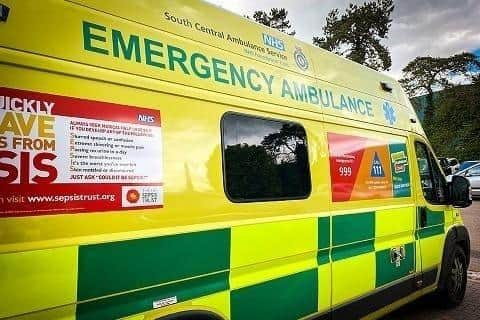Ambulance response times to life-threatening incidents on the rise in Milton Keynes and Aylesbury
and live on Freeview channel 276
New analysis of NHS Digital data by National World shows that the South Central Ambulance Service (SCAS) hasn’t hit its average target time in a year.
Category 1 cases, which the NHS categorises as an immediate response to a life threatening condition, such as cardiac or respiratory arrest, should be responded to within seven minutes, according to a national standard set out by ambulance trusts.


Advertisement
Hide AdAdvertisement
Hide AdLatest data, which covers the month of April only, shows the average response time to such incidents by the SCAS is nine minutes and 23 seconds.
Health bosses openly expressed concerns at dangerously long ambulance waiting times across the country.
The national average waiting time was recorded as nine minutes and two seconds, in the most recent figures.
After having a stroke last month, an NHS hospital boss said she was taken to A&E by her husband instead of by ambulance because of concerns over ambulance waiting times.
Advertisement
Hide AdAdvertisement
Hide AdAnd a top medic at the Royal College of Emergency Medicine recently said she use a taxi instead of an ambulance in the event of an emergency.
National World’s analysis shows that ambulance services are dealing with more heart attacks than in previous years.
These callouts have reached an all-time high since records began, in 2018, and represented 14% of all incidents, a rise from 9% 12 months ago.
There were nearly 20,000 more life threatening incidents recorded last month compared to in April 2021, and more than 26,000 more than during the height of the pandemic in April 2020.
Advertisement
Hide AdAdvertisement
Hide AdApril’s response times are the sixth highest recorded, since totals were first tallied in 2017.
Last month, response times were the highest on record, with the average reaching nine minutes and 35 seconds.
Paul Jefferies, assistant director of operations for South Central Ambulance Service NHS Foundation Trust (SCAS) said: "All ambulance services across the UK are facing a challenging time with the impact of the Covid pandemic on staff sickness levels and rising patient demand not just for emergency 999 services but right across the NHS health system.
“Despite these challenges, over the last 12 months, SCAS has been one of the top performing ambulance trusts for response times and consistently performed better than the average response times across England for all categories of emergency calls.
Advertisement
Hide AdAdvertisement
Hide Ad“We continue working with our NHS partners to reduce the impact of hospital handover delays on our service and at times of peak demand and pressure, we as a trust always focus on delivery of the safest and most responsive service to our most seriously ill and injured patients.
“It will continue to be a challenging time for the NHS as we move into summer and I would therefore urge people only to call 999 for life-threatening or serious emergencies to ensure we can respond quickly to those patients who really need us.
"For any urgent health problems, please use NHS 111 – either go online at 111.nhs.uk or call 111 - or the excellent range of urgent treatment centres, pharmacists and alternative NHS services in our region that are open from early in the morning till late at night every day, including weekends and bank holidays."
